Ukulele Vs. Guitar – The Differences
The ukulele and guitar, while sharing some similarities, have distinct characteristics that set them apart. Here’s a comprehensive comparison:
Physical Differences
The most noticeable difference is size, with ukuleles being 35-50% smaller than guitars. A standard guitar runs between 30-41 inches in length, while ukuleles typically measure 21-30 inches.
String Configuration
String Count and Material:
- Ukulele: 4 nylon/fluorocarbon strings
- Guitar: 6 steel strings
String Tension:
- Ukulele: 7-13 lbs of tension
- Guitar: 24-35 lbs of tension
Tuning and Sound
Standard Tuning:
- Ukulele: G-C-E-A
- Guitar: E-A-D-G-B-E
The ukulele produces a bright, gentle, and light sound with a softer tone due to its smaller body size, while the guitar delivers a richer, fuller sound with more depth.
Learning Curve
The ukulele is generally considered easier to learn for beginners because:
- Softer, low-tension strings are gentler on fingers
- Fewer strings make chord formations simpler
- Shorter scale length requires less finger stretching
- Smaller size makes it more kid-friendly
Musical Range
The guitar offers more versatility with:
- 18-20 frets (3 octave range)
- 6 strings for wider chord possibilities
In comparison, the ukulele has:
- 12-15 frets (2 octave range)
- 4 strings with more limited chord options
Ukulele Vs. Guitar – The differences. This is an important question to ask yourself because these two instruments have a lot of similarities, but they also have a lot of differences. If you’re just getting started on a new instrument, you must know what you’re getting into.
Both are fun to play and have lots of potential as a hobby, but there are some differences you should consider before you commit to one.
Ukulele Vs. Guitar – The Basic Differences
Ukulele and guitar sound completely different. Ukulele is based on guitar, but it is not the same as the latter.
The fingerboard of a guitar has more space between each string. This allows guitarists to press several strings at once, therefore producing sound when two or more strings are pressed at once. On the other hand, a ukulele only has four strings. Pressing two strings will create a discordant sound rather than a harmony.
On the other hand, there is a fifth string on the ukulele – the “high G”. These additional strings will make the sound richer. Ukulele is also louder than the standard guitar since it has a larger body and fretboard. The sound quality of a ukulele is also remarkable, but it depends on the player’s abilities.

Figure 1 – Ukulele Vs. Guitar
The neck of a guitar is longer than that of a ukulele. The size of a guitar is usually twice that of a ukulele. A standard guitar has 18 frets, while a ukulele only has 10 to 15. The sound produced by a guitar is louder and fuller than that of a ukulele because of its larger body and fretboard.
The strings of a guitar are also thicker than those of a ukulele. This makes it more difficult to press down the strings, particularly for beginners. The thicker strings also require more pressure to hold down, which can cause pain in the fingers after extended periods of play.
Guitars typically have six strings, while ukuleles usually have four or eight. The additional strings on a ukulele (known as the “high G”) make the sound richer but can be harder to tune. Ukuleles are typically tuned in pairs (unlike guitars which are often tuned in threes), with the two outermost strings being an octave apart.
The Difference in Size between Ukuleles and Guitars
The size of a ukulele is much smaller than that of a guitar. This makes it a lot easier to hold and play, especially for children or people with small hands. The strings on a ukulele are also shorter and thinner than those on a guitar, making them easier to press down and resulting in a softer, sweeter sound.
Ukuleles are typically between 35 and 50 percent smaller than most guitars.
Each instrument’s volume, tone, and playability are affected by the size difference between a ukulele and a guitar.
For many people, the increased versatility offered by guitars makes up for any challenges posed by their size. Guitars are generally much larger than ukuleles, which can make them more difficult to transport and store. Additionally, the larger size of guitars can make them more challenging to play for those with smaller hands. However, the larger size of guitars also allows for a wider range of notes and tones to be produced.

Figure 2 – guitar vs ukulele size ratio
The below table shows the size difference between Ukulele and Guitar:
| Name | Scale Length (Inches) | Overall Length (Inches) |
| Full-Size Guitar | 26 | 40 |
| 7/8 guitar | 25 | 38 |
| 3/4 guitar | 23 | 36 |
| tenor guitar | 21.5 | 32 |
| 1/2 guitar (mini) | 20 | 30 |
| 1/4 guitar (guitalele) | 17 | 26 |
| baritone Nui (Pono) | 23 | 35 |
| Venezuelan cuatro | 20 | 30 |
| baritone ukulele | 20 | 30 |
| tenor ukulele | 17 | 26 |
| concert (alto) ukulele | 15 | 23 |
| soprano ukulele | 13 | 21 |
| sopranino ukulele | 11 | 17 |
Some important notes:
- A “guitalele” is a tenor ukulele with two additional bass strings, often known as a 1/4 guitar.
- Like a baritone ukulele, a half guitar (like the Cordoba small) has two extra bottom strings.
- As the name implies, a “baritone nui” ukulele is the same size as a 3/4 guitar, but with an additional pair of bass strings.
Differences between strings of Ukulele and Guitar
The ukulele is a four-stringed plucked instrument of the lute family, usually with a rectangular body. The modern ukulele pronunciation differs from that of the Hawaiian language; “ukulele” translates as “flea.”
Guitar strings are bound together in a rope or cable wrapped around the tuning peg and tensioned when the guitarist tunes to pitch. This design leaves little room for adjusting intonation, which must be done manually by ear.
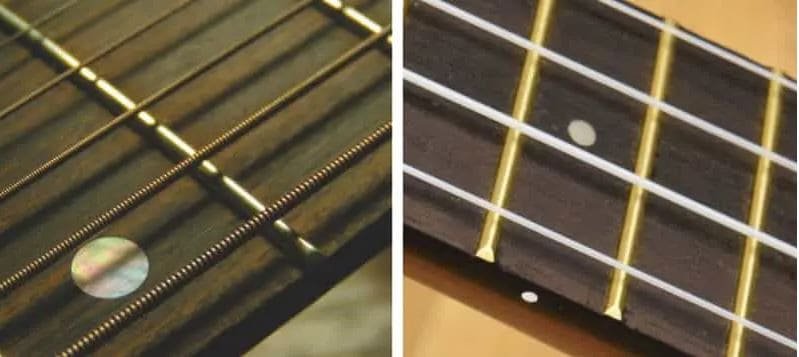
Figure 3 -Guitar strings vs ukulele strings
Guitar strings are typically made of steel, whereas ukulele strings are usually nylon or fluorocarbon. Steel strings produce a brighter sound than nylon strings, but they also require more effort to press down and can cause pain in the fingers after extended periods of play.
Nylon strings are easier to press down and produce a softer, mellower sound. Fluorocarbon strings are similar to nylon strings in terms of ease of playability, but they have a brighter sound.
Sound Differences Between Ukulele and Guitar
Although ukulele and guitar are string instruments, they have several notable sound differences. The most obvious difference is their size; a guitar is much larger than a ukulele.
This size difference affects the overall tone of the two instruments; guitars generally have a fuller, richer sound while ukuleles are brighter and crisper. Additionally, because of its smaller size, the ukulele has less space for resonance than the guitar and, as such, has less sustain.
The construction of the two instruments also contributes to their sound differences. Guitars usually have thicker strings than ukuleles, which gives them a lower pitch. Additionally, guitars typically have six strings, while most ukuleles only have four.
The type of wood used to construct an instrument can also affect its sound; for example, mahogany tends to produce a warmer tone while maple produces a brighter one.
Finally, how an instrument is played can impact its sound. For instance, strumming vs. picking will result in different sounds, as well as where on the string the player plucks/strums (closer to the bridge produces a sharper sound).
Different techniques like vibrato and slides can also create unique sounds that are characteristic of each instrument. All of these factors come together to create distinct sonic profiles for guitars and ukuleles that musicians can use to create their own personal styles.
Which is easy to learn – Guitar or Ukulele
Many people debate whether guitar or ukulele is easier to learn. While both instruments have their own unique challenges, we believe that the guitar is ultimately the more difficult instrument to learn. Here are three reasons why:
- First and foremost, guitars have significantly more strings than ukuleles. This means that there is much more information for beginners to take in, which can be overwhelming at first. There are simply more notes to learn on a guitar, making it a challenge for newcomers.
- The guitar may be harder to learn than the ukulele because of the required hand coordination. Both hands are needed to play the instrument properly, but with a guitar, you also need to use your left-hand fingers to pluck the strings while using your right hand to hold down the correct frets. This can be tough for beginners who haven’t developed good hand coordination yet.
- The last reason why we believe that guitar is tougher to learn than ukulele has to do with chords. On a ukulele, there are only four chords you need to know to play most songs. However, there are many different chords on a guitar, which can take some time and practice for beginners to master. The guitar has more complexities than the ukulele, making it the more challenging instrument of the two options.
Conclusion
Ukulele Vs. Guitar is a very interesting topic musicians want to talk about. Both the instruments look alike, but they have more dissimilarities than similarities. Ariose Music is a leading OEM brand that produces top-quality guitars and ukuleles. Please send us a message if you want to learn more or place an order to get the best quality ukulele and guitars.
Why Choose Ariosemusic?
China Top One-Stop Musical Instruments Wholesale Supplier
Because we’re always here and do it. When you choose us, you’ll feel the benefit of 10 years experience of with exported musical

 unique musical instrument gifts blue ukulele
unique musical instrument gifts blue ukulele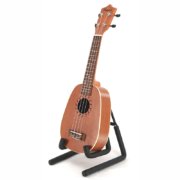 pineapple ukulele
pineapple ukulele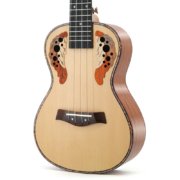 Spruce Ukulele
Spruce Ukulele 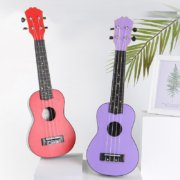 small musical instruments gifts
small musical instruments gifts 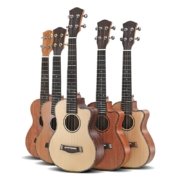 cutaway ukulele concert
cutaway ukulele concert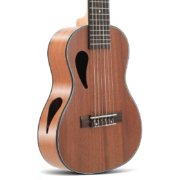 AUK-23 Steel Guitarlele
AUK-23 Steel Guitarlele 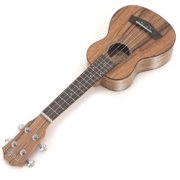 walnut wooden ukulele
walnut wooden ukulele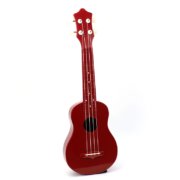 simple ukulele
simple ukulele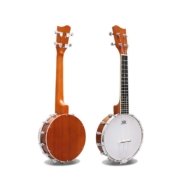 large ukulele
large ukulele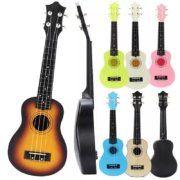 cheap toy musical instruments colorful ukulele
cheap toy musical instruments colorful ukulele Rosewood Ukulele
Rosewood Ukulele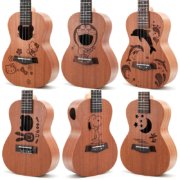 catoon ukulele
catoon ukulele plastic toy musical instruments
plastic toy musical instruments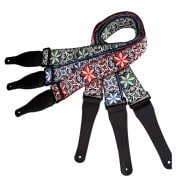
 colorful cool ukuleles
colorful cool ukuleles colorful ukulele
colorful ukulele

 Guitar Factory
Guitar Factory